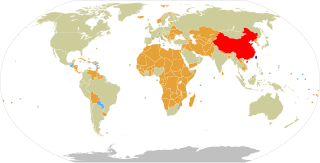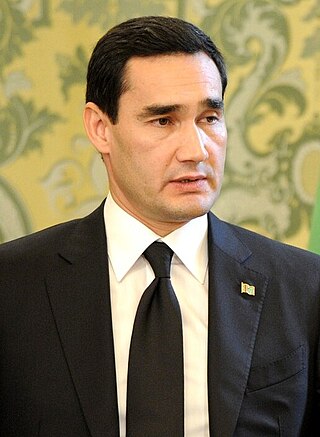Related Research Articles

Taiwan, formally known as the Republic of China (ROC), currently has formal diplomatic relations with 10 of the 193 United Nations member states and with the Holy See, which governs the Vatican City State, as of 16 January 2024. In addition to these relations, the ROC also maintains unofficial relations with 59 UN member states, one self-declared state (Somaliland), three territories, and the European Union via its representative offices and consulates under the One-China Principle. In 2021, the Government of the Republic of China had the 33rd largest diplomatic network in the world with 110 offices.

The politics of Turkmenistan nominally takes place in the framework of a presidential republic, whereby the President of Turkmenistan is nominally both head of state and head of government. However, as of 21 January 2023 a "national leader" was appointed who chairs an independent People's Council (viz.) with authority to amend the constitution, and who exercises supreme political authority. No true opposition parties are allowed; every registered political party supports the third and current President Serdar Berdimuhamedow. The country is frequently described as a totalitarian state.

The economy of Turkmenistan continues to recover from the 2014 downturn in hydrocarbon prices, but remains "in the grip of its worst economic crisis since the immediate post-independence period, driven in part by low gas prices, the suspension of gas exports to Russia between 2016 and 2019...and poor harvests." Former President Gurbanguly Berdimuhamedow at a session of the Cabinet of Ministers on March 11, 2021, called the rate of GDP growth unsatisfactory. When discussing the 2021 government budget, he noted that 2021 would be "as difficult" a year as 2020 had been.

Turkmenistan's declaration of "permanent neutrality" was formally recognized by the United Nations in 1995. Former President Niyazov stated that the neutrality would prevent Turkmenistan from participating in multi-national defense organizations, but allows military assistance. Its neutral foreign policy has an important place in the country's constitution. Although the Government of Turkmenistan claims to favour trade with and export to the United States, and Turkey, its single largest commercial partner is China, which buys the vast bulk of Turkmen natural gas via the Central Asia–China gas pipeline. Turkmenistan has significant commercial relationships with Russia and Iran and growing cross-border trade with Afghanistan. The Government of Turkmenistan often appears to use the conflicting interests of these regional powers as a means to extract concessions, especially on energy issues.

Turkmenistan is a landlocked country in Central Asia bordered by Kazakhstan to the northwest, Uzbekistan to the north, east and northeast, Afghanistan to the southeast, Iran to the south and southwest and the Caspian Sea to the west. Ashgabat is the capital and largest city. It is one of the six independent Turkic states. With a population of 6.5 million, Turkmenistan is the 35th most-populous country in Asia and has the lowest population of the Central Asian republics while being one of the most sparsely populated nations on the Asian continent.

Lebap Region is one of the regions of Turkmenistan. It is in the northeast of the country, bordering Afghanistan, Uzbekistan along the Amu Darya. Its administrative centre is Türkmenabat. It has an area of 93,727 square kilometers, and a population of 1,447,298 people.

Since its founding in 1949, the People's Republic of China (PRC) has had a diplomatic tug-of-war with its rival in Taiwan, the Republic of China (ROC). Throughout the Cold War, both governments claimed to be the sole legitimate government of all China and allowed countries to recognize either one or the other. Until the 1970s, most Western countries in the Western Bloc recognized the ROC while the Eastern Bloc and Third World countries generally recognized the PRC. This gradually shifted and today only 11 UN member states recognize the ROC while the PRC is recognized by the United Nations, as well as 181 UN member states. Both the ROC and the PRC maintain the requirement of recognizing its view of the One China policy to establish or maintain diplomatic relations. The United Kingdom did recognize the PRC in 1950 but an exchange of Ambassadors was refused by the PRC until 1972.

Gurbanguly Mälikgulyýewiç Berdimuhamedow is a Turkmen politician who is currently the chairman of the People's Council of Turkmenistan. He previously served as the 2nd President of Turkmenistan from 2006 to 2022, when he entered into a power-sharing arrangement with his son, Serdar, the current president.

Batyr Ataýewiç Berdiýew is a Turkmen former politician, who served as the foreign minister of Turkmenistan from 2000 to 2001. He also worked as an ambassador.

Oceania is, to the People's Republic of China and the Republic of China, a stage for continuous diplomatic competition. The PRC dictates that no state can have diplomatic relations with both the PRC and the ROC. As of 2024, eleven states in Oceania have diplomatic relations with the PRC, and three have diplomatic relations with the ROC. These numbers fluctuate as Pacific Island nations re-evaluate their foreign policies, and occasionally shift diplomatic recognition between Beijing and Taipei. The issue of which "Chinese" government to recognize has become a central theme in the elections of numerous Pacific island nations, and has led to several votes of no-confidence.

Saparmurat Atayevich Niyazov, also known as Türkmenbaşy, was a Turkmen politician who ruled Turkmenistan from 1985 until his death in 2006. He was first secretary of the Turkmen Communist Party from 1985 until 1991 and supported the 1991 Soviet coup attempt. He continued to rule Turkmenistan for 15 years after independence from the Soviet Union in 1991.

Serdar Gurbangulyýewiç Berdimuhamedow is a Turkmen politician serving as the third and current president of Turkmenistan since 19 March 2022. Berdimuhamedow had previously served in several other positions within the government of his father, Gurbanguly.

Solomon Islands and China (PRC) established official diplomatic relations in 2019. Prior to this, Solomon Islands had diplomatic relations with Taiwan.

Nauru–Taiwan relations are relations between the Republic of Nauru and Taiwan, officially the Republic of China (ROC). Official diplomatic relations were first established in 1980. Relations were first severed in 2003, when Nauru opted to recognize the People's Republic of China. Formal bilateral relations with Nauru were reestablished in 2005, and maintained until 2024.
References
- ↑ 中国組織別人名簿 [Directory of People in Chinese Organizations] (in Chinese (Taiwan)). Rajio Puresu. 1995.
- ↑ China Directory (in Chinese (Taiwan)). Radiopress. 2007.
- ↑ "Murat Nazarov appointed Turkmenistan's ambassador to China". turkmenistan.ru. 5 January 2009. Archived from the original on 24 February 2020. Retrieved 15 January 2024.
- ↑ "Assistant Foreign Minister Li Huilai Meets with Turkmen Ambassador to China Chinar Rustamova". Ministry of Foreign Affairs of the People's Republic of China. 3 February 2016. Archived from the original on 26 September 2021. Retrieved 15 January 2024.
- ↑ "Parahat Durdyev Accredited as Ambassador of Turkmenistan to People's Republic of China". Embassy of Turkmenistan. 21 February 2019. Archived from the original on 15 January 2024. Retrieved 15 January 2024.